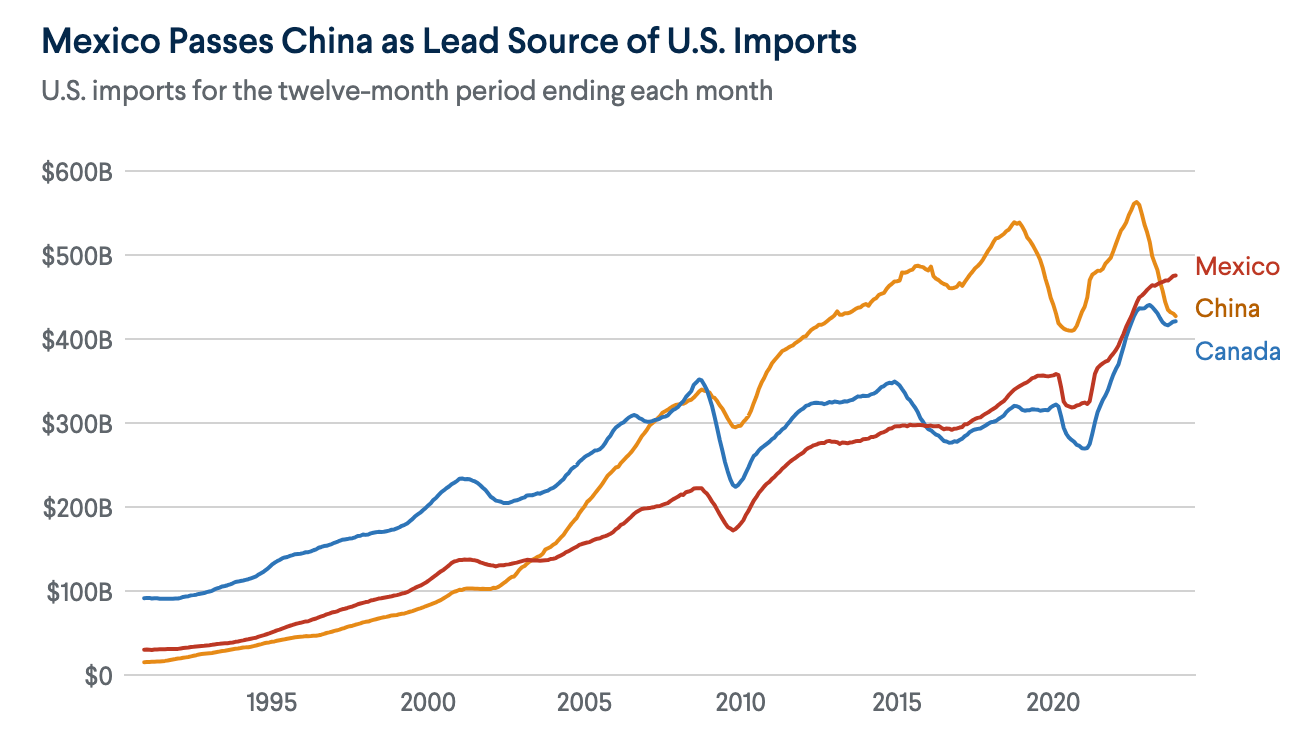Riding the Nearshoring Wave: Opportunities for Venture Capital in a Transforming Global Economy
In our rapidly changing world, we all have felt the constraints of supply chain challenges, especially amidst the Covid-19 pandemic. Imagine if a product could be designed in Silicon Valley, manufactured in Monterrey, Mexíco, and delivered to your doorstep in New York City—all within days.
This is the power of nearshoring, a transformative shift reshaping global supply chains.
Rather than outsourcing to far-flung regions, businesses are moving operations closer to home, and Mexico has become a standout destination. By leveraging its proximity to the US market, skilled workforce, and robust trade agreements, nearshoring allows businesses to reduce key costs while improving their supply chain resilience.
Earlier this year, Mexico overtook China as the United States’ largest trading partner for the first time in nearly two decades. With $476 billion in trade flowing from Mexico to the U.S. in 2023 alone, compared to $427 billion from China, the nearshoring boom has signaled that it has firmly taken root.
At L’ATTITUDE Ventures, we believe that this isn’t a fleeting trend—it’s a structural realignmentfueled by economic necessity and overarching geopolitical tensions. Tariffs on Chinese goods – which currently comprise $77 billion of the $79 billion generated from tariffs – along with a favorable USMCA trade agreement have made Mexico’s cost advantages even more compelling.
This is the power of nearshoring, a transformative shift reshaping global supply chains.
Rather than outsourcing to far-flung regions, businesses are moving operations closer to home, and Mexico has become a standout destination. By leveraging its proximity to the US market, skilled workforce, and robust trade agreements, nearshoring allows businesses to reduce key costs while improving their supply chain resilience.
Earlier this year, Mexico overtook China as the United States’ largest trading partner for the first time in nearly two decades. With $476 billion in trade flowing from Mexico to the U.S. in 2023 alone, compared to $427 billion from China, the nearshoring boom has signaled that it has firmly taken root.
At L’ATTITUDE Ventures, we believe that this isn’t a fleeting trend—it’s a structural realignmentfueled by economic necessity and overarching geopolitical tensions. Tariffs on Chinese goods – which currently comprise $77 billion of the $79 billion generated from tariffs – along with a favorable USMCA trade agreement have made Mexico’s cost advantages even more compelling.

Mexico’s key positioning has attracted significant global investment. In 2023, Mexico attracted $36 billion in foreign direct investment (FDI), with a whopping half directed at manufacturing. Industrial real estate demand has surged in tandem, with vacancy rates in manufacturing hubs like Monterrey falling below 5%. Companies like Tesla, Amazon, and Walmart have responded by investing further and deepening their presence in the country.

A Tesla billboard in Monterrey, Mexico, where the company plans to build an electric vehicle factory.
Julio Cesar Aguilar/AFP/Getty Images
All that said, nearshoring operations are not without a large set of challenges. For companies shifting supply chains to Mexico, sourcing reliable suppliers remains a significant hurdle. Many suppliers lack digital visibility, making them difficult to find and evaluate. Logistics pose another challenge, as companies navigate customs, infrastructure gaps, and the complexities of coordinating cross-border shipments.
Opaque systems often leave businesses without real-time visibility into their supply chain, increasing the risk of delays and inefficiencies. Cross-border payments further complicate operations, with high fees and long settlement periods significantly impacting cash flows. Post-purchase disputes, meanwhile, highlight the need for stronger legal frameworks and digital tools to resolve conflicts efficiently and preserve trust between partners.
Fortunately, we view these challenges as fertile ground for innovation. At L’ATTITUDE Ventures, we see immense opportunities for startups to address these pain points across a handful of key sectors like procurement, logistics, manufacturing operations and fintech.
In procurement, platforms like Prima connect U.S. companies with advanced manufacturing capabilities in Mexico, while Latii focuses on streamlining high-end manufacturing of windows and doors. Logistics startups like Cargo Produce and Auba are unifying cross-border operations and providing real-time insights to help businesses stay agile.
Financial services are also ripe for disruption, with companies like Efex and Finkargo building more resilient crossborder payment rails and filling critical financing gaps for importers. Across manufacturing, startups such as Valiot and Sunthetics are using AI to optimize production processes and product design, empowering suppliers to compete globally.
At L’ATTITUDE, we believe nearshoring will shape the next decade of cross-border collaboration and we’re excited to meet founders solving key challenges that are propelling the nearshoring opportunity forward.
If you’re a founder building solutions in procurement, logistics, financial services, manufacturing operations or something else, we’d love to hear from you, learn about what you're building and explore a partnership to create a more connected, resilient future together.
Thesis work by Israel Muñoz and contributor Alexander Noris .
Opaque systems often leave businesses without real-time visibility into their supply chain, increasing the risk of delays and inefficiencies. Cross-border payments further complicate operations, with high fees and long settlement periods significantly impacting cash flows. Post-purchase disputes, meanwhile, highlight the need for stronger legal frameworks and digital tools to resolve conflicts efficiently and preserve trust between partners.
Fortunately, we view these challenges as fertile ground for innovation. At L’ATTITUDE Ventures, we see immense opportunities for startups to address these pain points across a handful of key sectors like procurement, logistics, manufacturing operations and fintech.
In procurement, platforms like Prima connect U.S. companies with advanced manufacturing capabilities in Mexico, while Latii focuses on streamlining high-end manufacturing of windows and doors. Logistics startups like Cargo Produce and Auba are unifying cross-border operations and providing real-time insights to help businesses stay agile.
Financial services are also ripe for disruption, with companies like Efex and Finkargo building more resilient crossborder payment rails and filling critical financing gaps for importers. Across manufacturing, startups such as Valiot and Sunthetics are using AI to optimize production processes and product design, empowering suppliers to compete globally.
At L’ATTITUDE, we believe nearshoring will shape the next decade of cross-border collaboration and we’re excited to meet founders solving key challenges that are propelling the nearshoring opportunity forward.
If you’re a founder building solutions in procurement, logistics, financial services, manufacturing operations or something else, we’d love to hear from you, learn about what you're building and explore a partnership to create a more connected, resilient future together.
Thesis work by Israel Muñoz and contributor Alexander Noris .
